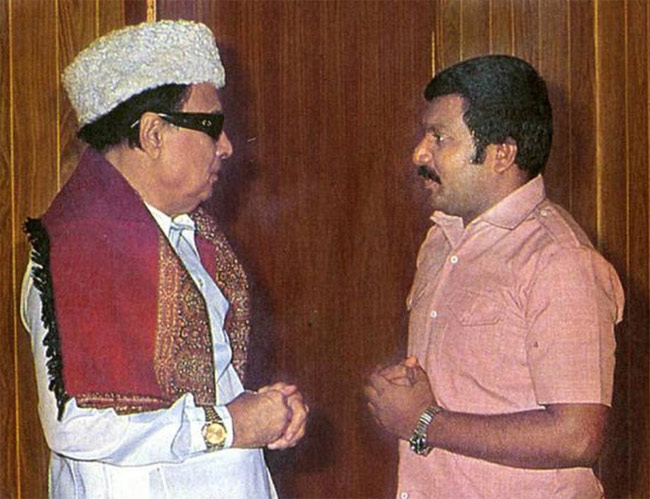LTTE publication claims ‘arm-twisted’ Prabhakaran got MGR’s backing
November 28, 2017 08:08 am
The refusal of the Liberation Tigers of Tamil Eelam (LTTE) to accept the Indo-Sri Lankan accord of 1987 led to a war between India and the Tigers, but the militant group claimed that the then Chief Minister M.G. Ramachandran unequivocally supported its stand on the issue.
Details of a tense conversation between LTTE leader V. Prabhakaran and Indian diplomat J.N. Dixit give an idea about how the LTTE viewed the accord and the enmity it induced between the organisation and the Indian government.
The LTTE alleged that India, particularly J.N. Dixit, sought to arm-twist the organisation into giving its approval for the accord, but that MGR threw his weight behind Prabhakaran, who resisted the idea.
“Whatever be you decision, I will support it,” MGR is quoted as saying in a publication by the LTTE that has become part of a voluminous book published by Chennai-based VOC Noolagam.
“The LTTE periodically came out with documents explaining its stand on various issues in India and Sri Lanka and we have collected them. We are going to launch the compilation as a book, along with the biography of Velupillai Prabhakaran,” said poet Ilayabharathi of VOC Noolagam.
In fact, the LTTE had then described 1987, the year in which the accord was signed, as a year in which “the Tamil Eelam freedom movement survived a difficult phase.”
“The liberation movement was crushed like copra in an oil press. It was a year of Sani (Saturn),” the LTTE had alleged.
Narrating the events preceding the signing of the Indo-Sri Lankan Accord, the LTTE’s publication said Prabhakaran was picked up by an Indian Air Force helicopter from the Suthumalai Amman temple in Jaffna. He was taken to Ashoka Hotel in New Delhi. Anton Balasingham, the LTTE ideologue, and Dileepan, another LTTE leader, were also with him.
“Dixit gave them a copy of the accord and urged them to give their stand in one hour. It is an accord between two governments and you cannot make any amendments. We expect you to accept it,” Dixit told the leaders, it said.
Dixit met the LTTE leader after an hour, but Prabhakaran had made it clear he could not disband the 15-year-old movement sustained by the blood of Tamils in 72 hours. “You expect us to give up arms before achieving a solution? We cannot drop the weapons that provide security to our people without any assurance. We cannot accept the accord without the approval of our people,” Prabhakaran had told Dixit and other officials.
Dixit told them, “Whether you accept it or not, the accord will be implemented. If you do not give up your arms, we will use the Indian Army to complete the task. Do not forget that you are under our custody and there is no guarantee that you can leave this place.”
‘You will be destroyed’
When Prabhakaran stood his ground, Dixit said, “India is a superpower and you are a small armed group. Think before whatever you say. You will be destroyed.”
Then he asked Balasingham to take a decision in consultation with Prabhakaran and others. “The next two days passed with RAW and IB officials putting pressure on him to accept the accord. As they realised they could not succeed in their attempt, India sought the help of Chief Minister MGR,” the LTTE said.
But Prabhakaran rejected the proposal in front of MGR who was flown to Delhi by the central government. Listening to both sides, MGR told Dixit that he wanted to discuss the issue with Prabhakaran.
“Prabhakaran was wondering what would be on MGR’s mind. He wondered whether MGR would urge us to support the accord and whether it will lead to breaking of relationship between the LTTE and him. But MGR smiled at him and made clear his stand,” the publication said.
Prabhakaran then decided to meet Rajiv Gandhi since all other attempts to convince the Indian officials failed.
India ‘s former national security adviser and former foreign secretary J.N. Dixit, was also India’s high commissioner in Sri Lanka from April 1985 to April 1989
He was the High Commissioner in Colombo in 1987 when India signed an accord with Sri Lanka government and deployed of the Indian Peace Keeping Forces (IPKF).
J.N. Dixit in his book, Assignment Colombo, had recalled the lengthy exchange he had with Prabhakaran on all the details of the agreement in the presence of MGR and Panruti S. Ramachandran.
“But Prabhakaran remained indecisive and demanded that he be sent back to Jaffna.
“MGR told him to be patient and stay back in Delhi for further discussions,” he had said.
“Prabhakaran also said he could not endorse any agreement which kept the merger of the northern and eastern provinces temporary. He also said that no agreement should be signed without closure of all the military camps of Sri Lankan forces in the northern and eastern provinces. The meeting was inconclusive. I told Prabhakaran that this was the fourth time he was trying to embarrass the Prime Minister of India. I recalled that he had done this at Thimpu, again in August/ September 1985 and then again in Bangalore. I told Prabhakaran that he was being shown the final draft of the agreement, which he should study before taking a final decision.
“It was the assessment of Indian officials that Prabhakaran had changed his mind after the discussions held in Madras on his way to Delhi.”
Source: The Hindu
-Agencies














